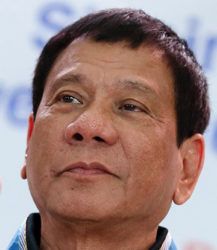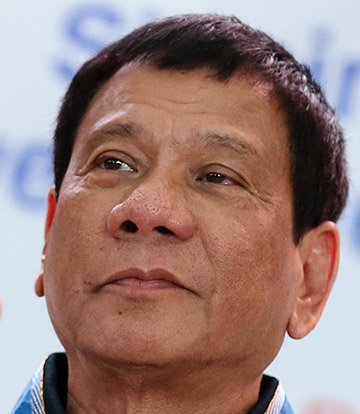MANILA/TOKYO, (Reuters) – Philippines President Rodrigo Duterte lashed out anew at the United States yesterday and said it could forget a bilateral defence deal if he stayed in power long enough, in the latest jarring statement from Manila about the future of the alliance.
Duterte delivered his new broadside as he was about to board a plane for an official visit to fellow U.S. ally Japan, a big investor in the Philippines that is becoming nervous about its apparent pivot towards rival power China.

The volatile, crime-busting Duterte had on the eve of the visit softened his remarks last week about a “separation” from Washington, telling Japanese media he was not planning to change alliances and was only seeking to build trade and commerce with China.
But he pulled no punches yesterday when he said he hated having foreign troops in the Philippines and told the United States not to treat his country “like a dog with a leash”.
Commenting on a visit to Manila on Monday by Daniel Russel, an Assistant Secretary of State, Duterte said Washington should forget about an Enhanced Defence Cooperation Agreement (EDCA) with the Philippines if he were to stay in charge longer.
“You have the EDCA, well forget it. If I stay here long enough,” he said. “I do not want to see any military man of any other nation except the Filipino. That’s the only thing I want.”
He did not elaborate on what staying longer meant. In the Philippines, a president is allowed only one six-year term in office.
The remarks were another perplexing swing from Duterte, who last week announced in China his “separation” from the United States, before assuring that ties were not being severed and he was merely pursuing an independent foreign policy.
U.S. State Department spokesman John Kirby said Duterte’s remarks were “inexplicably at odds” with the relationship the two countries continued to enjoy and Washington was going to “take the long view” on ties with Manila.
“We’ve seen this rhetoric and then we’ve seen it walked back,” he told a regular news briefing. “We’re not going to react and respond to every bit of rhetoric. We’re going to continue to work at this relationship.”
Kirby said the United States would continue to meet its obligations in its defence treaty with the Philippines and had not seen Duterte’s comments against it translate into policy.
“The long view in our mind is a sustained, healthy, vibrant, bilateral relationship with the people and the government of the Philippines. That’s what we’ve had for 70-odd years and that’s what we expect to have for 70-plus more years … so that’s where our focus is on,” he said.
Duterte’s latest swipe at Washington could rattle Japanese Prime Minister Shinzo Abe, who wants to keep ties with the Philippines tight. Abe is to hold rare one-on-one talks with Duterte at his residence in Tokyo this evening.
Before leaving for Tokyo, Duterte described Japan as a true friend that had played a “preeminent and peerless role” as a big investor and Philippine development partner.
But he quickly became vexed when answering questions and held up the front page of a Philippine newspaper which carried the headline “Duterte sparking international distress – U.S.”.
Duterte vented at Washington on several fronts, from its bombing of Manila at the end of World War Two to embassy officials once questioning his intentions when he applied for a visa to visit a girlfriend.
“You know, I did not start this fight,” he said.
Director of U.S. National Intelligence James Clapper said Duterte was playing to a domestic audience.
“President Duterte has a point of view, I think conditioned quite a bit by his own life and his apparent resentment of the United States and its relationship with the Philippines, so he has reached out to the Chinese,” Clapper said at the Council on Foreign Relations in New York.
Clapper said he had recently had a private meeting with senior Philippine intelligence officials. “They are themselves concerned about the impact on our relationship,” he said. “So we will just have to see how it plays out.”
Duterte’s overtures to China and hostility towards the United States have raised questions about what his overall goal is and the extent to which his actions could shake up the geopolitical dynamic of a region wary about Beijing’s growing influence and U.S. staying power.
Abe has sought to strengthen ties with the Philippines and other Southeast Asian countries, particularly Myanmar, Thailand and Vietnam, as a counter-balance to Beijing.
Japanese Chief Cabinet Secretary Yoshihide Suga said yesterday that both presidents would have a meeting to “further the strategic partnership with the Philippines”.
Japanese officials said Abe would not overtly try to mediate between Tokyo and Washington but would probably explain the importance of the U.S. role in the region. Kirby said Washington had no “special expectations” for Duterte’s Tokyo visit.

